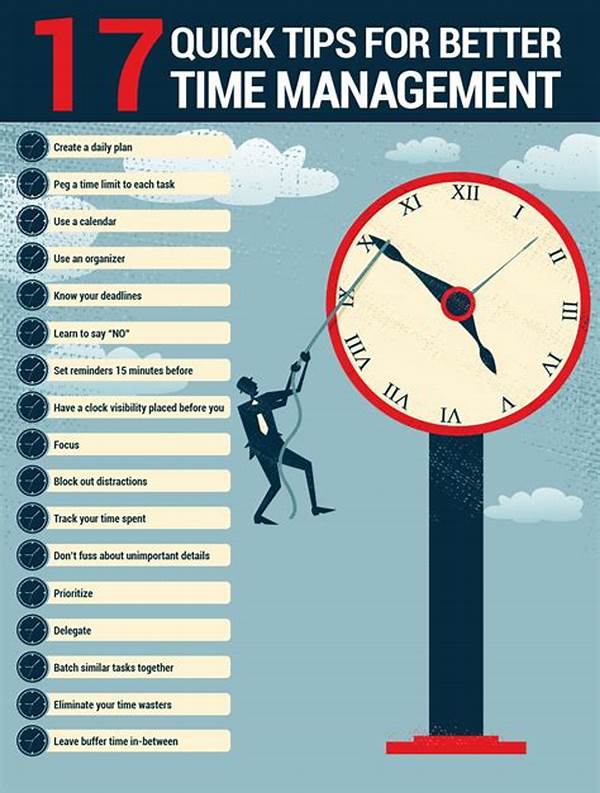Tips for Time Management
In today’s fast-paced world, where every second counts, mastering the art of time management is key to achieving success and maintaining sanity. Whether you’re juggling multiple projects, balancing work with personal life, or just trying to find some free time for yourself, effective time management can be your best friend. The challenge of managing time doesn’t just lie in our daily tasks but also in the unexpected interruptions and the ever-tempting distractions that life throws at us. Fortunately, by implementing simple yet powerful strategies, anyone can harness the ability to make the most of their time. In this article, we will explore valuable tips for time management to help you become more productive, focused, and less stressed. The journey to better time management is not an overnight transformation but rather a series of small, purposeful steps that lead to a more organized and fulfilling life.
Read More : Stop Feeling Overwhelmed: 5 Shocking Reasons Your To-do List Is Too Long (and The Fix)!
Imagine Susan, a young entrepreneur, constantly feeling overwhelmed by the demands of her business and personal commitments. Her calendar is packed, her emails are never-ending, and her personal life is on the back burner. But then, she discovers the power of time management. By setting clear priorities and learning to say no to non-essential tasks, Susan finds time to focus on what truly matters, achieving her goals without burning out. Her story is a testament to what can happen when you start taking control of your time.
A crucial aspect of time management involves having a plan. Without a roadmap, it’s easy to get lost in the daily shuffle. Creating a well-organized schedule, setting realistic goals, and prioritizing tasks allows you to visualize where your time is going and ensures that you stay on track. Tools like planners, apps, and digital calendars can be quite beneficial in this regard, helping you organize your day efficiently.
But planning is just one part of the equation. It’s also essential to monitor and adjust as you go along. Regularly review your progress and modify your strategies to ensure ongoing productivity and stress management. This dynamic approach enables you to adapt to changes and stay resilient in the face of unforeseen challenges. Compelling yet straightforward, these tips for time management offer a blueprint for anyone looking to reclaim control over their time and, ultimately, their life.
Effective Time Management Strategies
1. Set Clear Objectives: Begin by outlining what you need to accomplish each day. Having clearly defined goals keeps you motivated and focused.
2. Prioritize Tasks: Not every task holds the same value. Identify and tackle high-priority tasks first to maximize your productivity.
3. Use Technology Wisely: Apps and digital tools can help you stay organized, remind you of upcoming deadlines, and streamline your workflow.
4. Limit Distractions: Create a working environment that minimizes interruptions. Identify time-stealers and eliminate them to maintain high levels of concentration.
5. Take Regular Breaks: Avoid burnout by scheduling short breaks to recharge. A well-rested mind is more efficient and creative.
6. Review and Reflect: At the end of each day, review what you achieved and plan for the next day. This habit can significantly improve your time management skills over time.
7. Delegate When Necessary: You don’t have to do it all. Learn to delegate tasks that others can handle, saving your time for more critical activities.
The Art of Prioritization in Time Management
One of the most valuable tips for time management is learning to prioritize tasks effectively. In the grand scheme of things, not all tasks are equal. Some require immediate attention, while others can wait. Learning this distinction is crucial. You can practice prioritization by using methods such as the Eisenhower Box, which separates tasks into four categories based on urgency and importance. By focusing on what truly matters, you ensure that your energy and resources are spent wisely, propelling you towards your goals with greater efficiency.
Understanding Your Time Management Goals
By understanding what you aim to achieve with better time management, you can tailor your strategies to suit these objectives. Are you trying to find more leisure time, or do you aim to complete more work in less time? Each goal will require a different approach. For instance, if your goal is to reduce stress, incorporating relaxation techniques alongside your time management practices can be beneficial. Conversely, if efficiency is your primary concern, you might focus more on eliminating time-wasting activities.
Finding your unique balance is key to sustainable success. As you work on your time management skills, always refer back to your goals. They are your compass, guiding your path and transforming aspirations into achievable realities. Engage with these tips for time management, and discover a future where your productivity is optimized, and your true potential is unleashed.
Goals for Time Management
Discussion on Time Management Goals
Embarking on a quest for better time management starts with clear and insightful goals. One might wonder, what do people actually seek to gain from mastering time management? This diverse spectrum of goals serves as a testament to the profound impact that time management can have. Let’s dive into the rationale behind popular time management objectives.
Many people aim to boost productivity and efficiency. Whether they are in a corporate setting or running their own business, maximizing output within limited hours is a top priority. Time management mechanisms such as the Pomodoro Technique, which breaks work into intervals, are designed specifically to enhance productivity.
Interestingly, the personal realm of goals is just as important as the professional one. Individuals are increasingly recognizing the importance of stress reduction and improved well-being. By structuring their day with breaks and monitoring workload, they contribute not only to better productivity but a healthier lifestyle and work-life balance.
Additionally, prioritizing tasks and effectively saying “no” to non-essential demands forms another key goal. This act of decisiveness can dramatically increase focus, enabling individuals to direct their energy toward tasks that align with their broader objectives.
Ultimately, the art of time management isn’t just about managing tasks but also about enhancing the overall quality of life. By instilling structure and order, individuals find themselves more liberated than constrained, having ample opportunity to pursue their passions outside their immediate professional duties.
Implementation of Effective Time Management Strategies
For those on a mission for success, implementing robust and practical time management strategies is like finding a treasure. It’s vital to not only learn these techniques but also to practice them diligently. This ensures they effectively fit into your lifestyle. Here we are going to uncover some inside stories and practical methodologies to make the most of time.
Stories of transformation abound when it comes to time management. Take, for example, professionals who initially struggle with time allocation but eventually become experts in delegating tasks. As they outsource what can be delegated, they open up their schedules for activities that only they can excel at. This strategic approach is a game-changer.
Moreover, technology plays an instrumental role too. By using dedicated apps, individuals can facilitate seamless scheduling, set timely reminders, and track their progress. They can instantly adjust their agenda as needed, thanks to these digital tools. No longer do you have to juggle multiple tasks manually; efficiency becomes second nature.
Let’s not forget the power of routines. Savvy individuals adopt daily practices that allow them to dive into work effortlessly, as their structured habits dictate their level of success. Incorporating these tips for time management into everyday living simplifies a daunting quest into an enjoyable journey.
The cases of communities coming together, exchanging ideas, and sharing their “aha moments” on social platforms highlight the collective wisdom that exists in navigating time. Individuals from different walks of life meet, exchanging solutions and learning from one another’s experiences. These examples illustrate the immense impact that collaboration can have in the realm of time management.
7 Tips for Time Management
Effective Daily Routines for Time Management
Having a consistent daily routine is an often-underestimated tip for time management. This set pattern not only sets your day up for success but offers mental clarity and a sense of accomplishment. Imagine waking up every day with a plan in hand: morning rituals that energize you and map out the tasks of the day, ensuring optimal productivity.
Creating such routines may involve setting aside specific times for planning short-term objectives. There’s a rejuvenating joy in completing tasks that make room for relaxation and family, alongside fulfilling your professional duties.
Establishing patterns helps reduce decision fatigue. When our tasks are predetermined, energy can be preserved for creativity and problem-solving. As a result, life feels more balanced, leaving you to focus on growth and enjoying moments along the way.
Moreover, embracing technology can enhance these routines. With apps that sync calendars across devices, a seamless schedule integrates with lifestyle, supporting time management goals. Mornings start naturally without the chaos of delaying important calls over a forgotten appointment. The assurance of structure guides productivity.
Maintaining Balance with Time Management
Achieving an ideal balance through time management remains a universal goal. Uniting all aspects of life harmoniously is the modern challenge many face. A finely tuned blend of work, family, leisure, and self-care defines the fulfilled life countless people strive for today. But how can one accomplish this desired equilibrium?
The answer often circles back to prioritization. Recognizing the core values driving decisions allows individuals to design a personalized time management strategy that aligns with specific aspirations. Prioritizing purpose over frivolous time-consuming elements creates space for vital engagements.
As we dive into this discussion, let’s emphasize setting boundaries—a pivotal component in establishing balance. Firm limits enable focus, fostering dedication on desired pursuits and ultimately refining the management of time.
Further, cultivating relationships enriches existence and supports effective time management. From nurturing communication with loved ones to cooperative professional endeavors, connections are vital. The inherent human need for interaction propels us toward a rewarding life.
Finally, stay adaptable. Life ebbs and flows, presenting new circumstances that demand flexibility within time management. Adapting to change will empower your journey in achieving a successful life balance, ensuring sustainability in your pursuit of goals.


